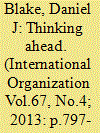| Srl | Item |
| 1 |
ID:
117853


|
|
|
|
|
| Publication |
2012.
|
| Summary/Abstract |
A burgeoning body of literature assesses the sociopolitical factors that influence investment decisions, including the nature of domestic institutions, societal rights, and participation in international institutions and agreements. Oddly enough, these have evolved largely as separate lines of research, and little effort has been made to compare the relative importance of these sociopolitical factors in making investment decisions. Moreover, though the diverse nature of foreign direct investment (FDI) is widely noted, extant research relies almost exclusively upon the examination of aggregate FDI. As a result, scholars have little insight into the ways that investors prioritize these factors, or how they vary across different industries. In an effort to synthesize these strands of research and further deepen our understanding of the determinants of investment decisions, this study models the prospective impact of several sociopolitical variables that have been found to significantly influence FDI-human rights, democratic governance, and commitment to international trade agreements and investment treaties-across multiple investment sectors.
|
|
|
|
|
|
|
|
|
|
|
|
|
|
|
|
| 2 |
ID:
124394


|
|
|
|
|
| Publication |
2013.
|
| Summary/Abstract |
International institutions help governments make credible commitments to other state and nonstate actors by raising the costs of commitment violation. However, in doing so these institutions generate sovereignty costs for national governments by constraining the autonomy they have to develop and implement policy. Governments respond to this trade-off between the credibility of commitments and policy autonomy differently depending on their time horizons and this shapes their preferences over the design of credibility-enhancing institutions. Governments with long time horizons expect to govern in the future, anticipate that conditions may shift over time, and therefore seek institutional designs that will afford them greater freedom to modify policies in response to changing economic and political conditions. Governments with shorter time horizons, on the other hand, do not anticipate being in power long into the future and therefore are less concerned about maintaining greater room to manipulate policy. I develop this argument in the context of bilateral investment treaties (BITs), focusing in particular on the legalization of obligation in national treatment commitments. I test the argument using an original data set of the design of national treatment obligations in a random sample of 342 BITs. I find that net importers of FDI with longer time horizons are more likely to build in greater policy autonomy in their BITs by scaling back the legalization of their national treatment obligations and that this relationship is robust to controlling for selection into investment treaties.
|
|
|
|
|
|
|
|
|
|
|
|
|
|
|
|